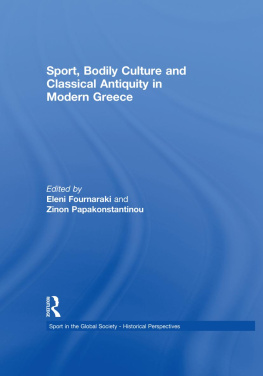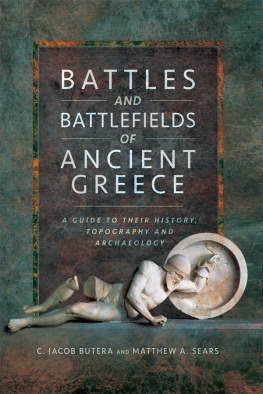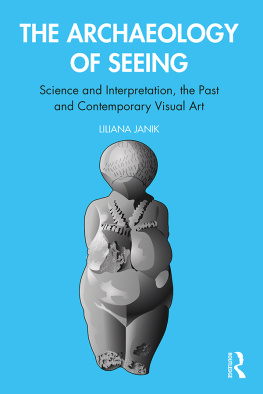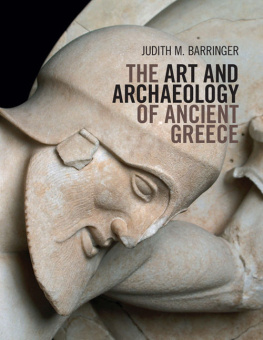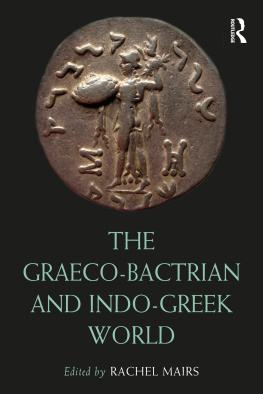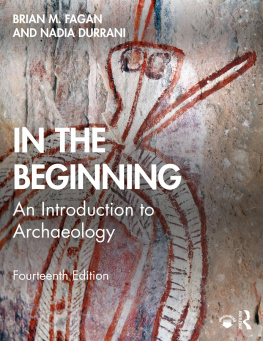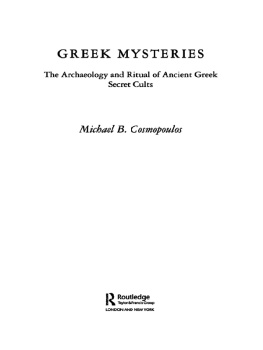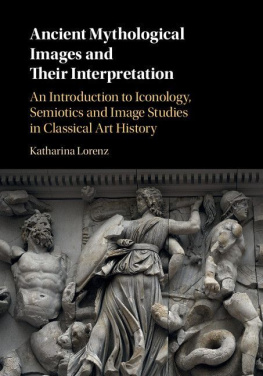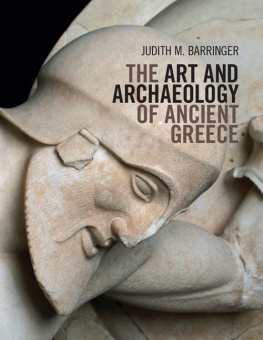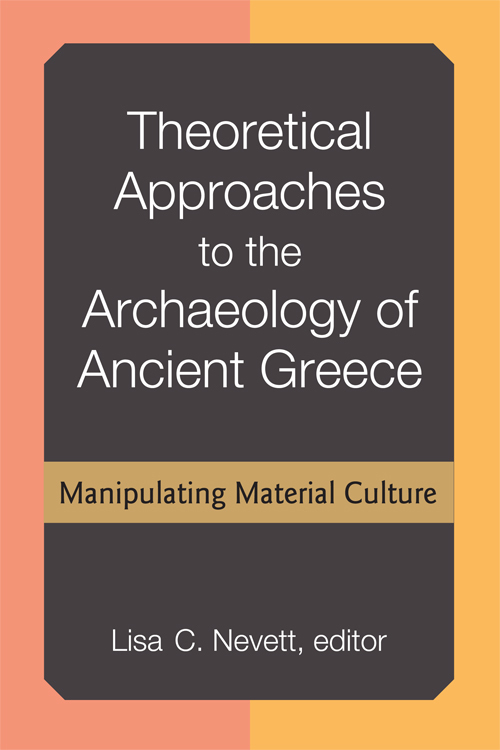
Theoretical Approaches to the Archaeology of Ancient Greece
Theoretical Approaches to the Archaeology of Ancient Greece
Manipulating Material Culture
Lisa C. Nevett, editor
University of Michigan Press
Ann Arbor
Copyright 2017 by Lisa C. Nevett
All rights reserved
This book may not be reproduced, in whole or in part, including illustrations, in any form (beyond that copying permitted by Sections 107 and 108 of the U.S. Copyright Law and except by reviewers for the public press), without written permission from the publisher.
Published in the United States of America by the
University of Michigan Press
Manufactured in the United States of America
A CIP catalog record for this book is available from the British Library.
Library of Congress Cataloging-in-Publication data has been applied for.
ISBN: 978-0-472-13023-8 (hardback)
ISBN: 978-0-472-12253-0 (e-book)
Contents
It is a pleasure to thank here a number of people and institutional divisions who have provided valuable support for the Theory in (Ancient) Greek Archaeology Conference, for this volume, or for both. The planning of the conference was undertaken with the assistance of a committee of students from the University of Michigans Interdepartmental Program in Classical Art and Archaeology. Among these, Elina Salminen was particularly helpful in undertaking significant administrative responsibility. I thank the conference speakers for traveling to Ann Arbor to present their work and participate in the discussion, particularly those who came from distant locations, including Greece, Germany, Austria, and Britain. The discussion was enhanced by the participation not only of our interdepartmental programs students and faculty but also of a number of colleagues from other subdisciplines represented in the Department of Classical Studies at Michigan, demonstrating the potential of theoretical approaches to reach across our subdisciplinary boundaries. The conference was made possible by funds from the College of Literature, Science, and the Arts, the Department of Classical Studies, and the Interdepartmental Program in Classical Archaeology at the University of Michigan, Ann Arbor.
I am grateful to our commissioning editor at the University of Michigan Press, Ellen Bauerle, for the idea of producing a book based on some of the conference papers. Her support and faith in the project have kept it on track during the long process of bringing together the contributions. The press anonymous referees also made helpful comments that improved the volume. Thanks are due to the contributors for their patience while the final outstanding pieces were rounded up and while referees comments were solicited. I would also like to thank Mary Hashman for carefully shepherding the book through the production process, Kyle Dunn for producing the index and for his attention to details, and Lorene Sterner for generous last-minute help with figure 11.1.
I thank the following copyright holders for permission to reproduce images from their collections: Art Resource, New York; the Trustees of the Ashmolean Museum, Oxford; the Athenian Agora Excavations; the Bauhaus-Archiv, Berlin; the Trustees of the British Museum, London; the Deutsches Archologisches Institut, Rome; the Gordion Archives, University of Pennsylvania Museum of Archaeology and Anthropology; Sharon Herbert and the Tel Kedesh excavations.
Lisa C. Nevett
The present volume aims to stimulate debate about the direction being taken by the archaeology of culturally Greek communities during the first millennium BCE.the use of archaeology reveals disparities between the views and attitudes articulated by the ancient authors, those implied by other media (e.g., painted pottery), and/or those embodied in the daily practice of significant proportions of the population.
Hand in hand with taking this more active and independent approach, scholars are also increasingly realizing that to make the most of the evidence requires a self-consciously theoretical approach. It has often been assumed that one can approach the material record from some kind of atheoretical perspective that does not involve the application of implicit beliefs about the importance of different types of evidence or their relationship with ancient society. Such a view is becoming widely discredited in other archaeological subdisciplines, where scholars have argued that any piece of research necessarily invokes a theoretical stance, whether explicit or implicit, simply through the selection of problems for investigation, the evidence to address them, and the methods adopted to evaluate that evidence and to draw conclusions from it. Thus, while a thorough knowledge of the physical evidence must be the starting point for any inquiry, a completely empirical approach that fails to consider its underlying assumptions or to invoke a theoretical stance can never use the data to their full potential. This is because it cannot reliably invoke a coherent methodology and will fail to address the wide range of questions about ancient Greek society to which such evidence can offer access.
There are, nevertheless, significant challenges to overcome in implementing theoretically based approaches in classical Greek contexts. As is also the case in the archaeology of other cultures, the adoption of a specific theoretical perspective does not necessarily provide a set methodology. The data sets are often relatively numerous, and the chronological control is relatively fine, but the information collected has sometimes been insufficiently detailed to sustain close scrutiny, which can cause difficulties in bridging the divide between abstract ideas (the theoretical framework) and the archaeological evidence itself (the case studies being used). At the same time, individual research projects have been shaped by the broad social, cultural, and political concerns of the contemporary world within which they were carried out, unconsciously drawing on modern notions such as concepts of Hellenism or the attitudes and practices of recent European colonialism. Greek archaeology has also had to deal with the legacy of its long history as a discipline, including its origins during the Enlightenment and its intimate relationship with the study of ancient texts, which have led to deeply entrenched assumptions about the scholarly value The difficulties these assumptions present can be seen in the context of some of the textbooks that have tried to present more theoretically informed summaries of the archaeology of Greece in the first millennium BCE. The result can be a jarring disjunction between the picture of that period and the preceding periods in terms of the topics covered (as in Bintliff 2012), or there can be a degree of disconnection between the evidence and some of the theoretical ideas (as in Stansbury-ODonnell 2015).
For reasons such as these, the explicit use of theoretical frameworks in the archaeology of first-millennium BCE Greece has not had a high profile in perceptions of the discipline. It is, nevertheless, not a new phenomenon and can be traced back at least as far as the 1970s. In 1979, the journal Hephaistos was founded with the specific aim of publishing articles that engaged in discussion of theory and method in classical archaeology (broadly construed to include Egypt and the Near East as well as Greece and Rome), and adjacent disciplines. In specifically Greek contexts, these kinds of approaches have taken hold in several well-defined research areas. Work on the iconography of Attic pottery from the fifth and fourth centuries BCE, for instance, has incorporated sophisticated ideas about how the content of painted scenes might have been intertwined with the lives of the producers and viewers of such vessels. Early work includes articles published in
Next page

